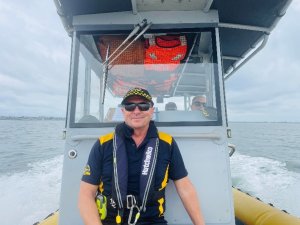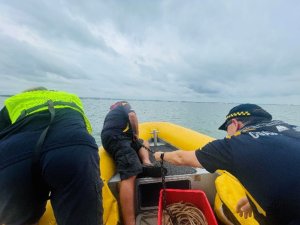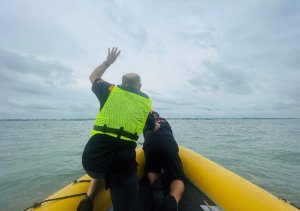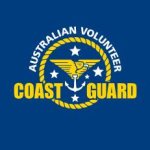Member feature written by Meg Baresic
I have always harboured a great fear of the deep sea because of the many things we just can’t see. And those that you can, being looming waves and shark fins, have never really taken my fancy. It was thus with trepidation (and a stomach full of nerves) that I approached the Australian Coast Guard for a visit.
First established in 1972, the Australian Coast Guard has been operational for over 50 years thanks to the help and support of hundreds of volunteers. On any given day, you will likely find 10 volunteers helping from their base at Manly, in Brisbane’s East. Be it working in the control room, training new members, or assisting on a rescue, those who get recruited are no doubt in for a challenging but rewarding experience.

Upon my arrival, I’m greeted warmly by Rick Holder, an ex-navy officer and one of the many volunteers who assist the Australian Coast Guard. As he takes me on a tour around the base, Rick notes that the Coast Guard undertakes a new recruitment process every 2 years. While this is less frequent than many other volunteer organisations, Rick explains that it’s due in part to their thorough screening process. The Coast Guard seeks to ensure that those who volunteer are committed to helping out for a decent length of time, particularly given the extensive and continued training provided by the organisation.
While at the base, I’m lucky enough to be invited onto one of their boats to observe a volunteer assessment. “Oh, god. I can’t believe I have to do this with a journo on board!” jokes Mark, the man currently completing his assessment. I laugh and promise him I’ll only write a glowing report (spoiler: he aced the assessment).

As we slowly coast out of the marina, I ask Rick why he volunteers with the Coast Guard. “I wanted to give back, and I have a strong sense of service that flows from my time in the military. I also love the friendship and comradery that comes with the gig. Everybody leaves their ego at the door.” Given it’s a door through which hundreds of volunteers make their way each year, it’s important that those who participate help to foster a sense of community. His sentiments are echoed by the other volunteers, with Ron (a man I meet later in the morning) explaining that the camaraderie amongst the volunteers is his favourite part of the role. Having been with the Coast Guard for 38 years, Ron’s word isn’t one to question.
As Mark completes his assessment, Rick explains the drills being done to ensure Mark has met the requirements. At one point, a ‘man overboard’ scenario is staged and a rescue is completed, instilling in me an understanding of the skills and multi-tasking required (and a huge appreciation for the fact that I wasn’t tasked with playing the role of ‘man overboard’).

The importance of volunteers cannot be understated within the context of the Australian Coast Guard. All staff members are volunteers, and although they receive some funding from the government, the service remains operational thanks to fundraising and donation efforts organised by their volunteers. Without volunteers, there would be no Coast Guard. It’s as simple (and humbling) as that.
“We went out this morning with 5 people, and we came back with all 5 intact,” jokes Rick as we pull back into the marina. “I’d say that’s a job well done.” As I leave the Australian Coast Guard after an insightful and novel morning, I glance back at the group of men I have had the privilege of meeting. Should I ever find myself in a sticky situation at sea, I’d be thrilled to be greeted by the likes of the Australian Coast Guard.

The Australian Volunteer Coast Guard is a marine search and rescue organisation comprised entirely of volunteers.
Operating under State and Territory Emergency Management frameworks, their distinct yellow vessels respond to a variety of marine incident types, rescuing thousands of people each year. They also work in support of other agencies in response to events such as marine fire and medical evacuation from vessels.
In addition to their marine search and rescue responsibilities, as a Registered Training Organisation, we can deliver accredited training not only to our volunteers but also to offer public education courses.
Find out more about volunteering for the Australian Coast Guard by visiting their website.
About Meg
Meg Baresic is currently studying a Bachelor of Laws and Journalism at QUT. When she’s not drinking coffee or catching up with friends, Meg loves chatting to and learning from inspiring and interesting people.
Did you like this article?


